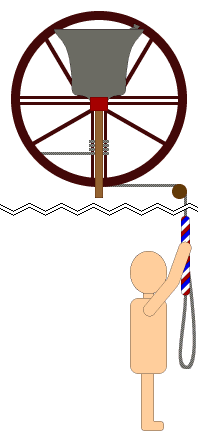Get Involved
What is Ringing

Church bells are rung to call people to worship, and the act of campanology has been practised for thousands of years. The first use of large bells is credited to Bishop Paulinus of Nora near Naples. His province of Campania gave the name campanile to bell-towers, and subsequently the English word campanology.
By 1400, many English parish churches had 3 or more bells swinging to and fro in the church tower on special occasions. At first the bells were sounded haphazardly, as still happens in most European countries, but by 1600 bells were being rung full-circle. Change ringing, where bells change places in mathematical patterns, began to spread quickly throughout the English speaking world.
Today, the art of ‘full circle’ ringing is thriving in Britain (where there are over 5000 towers) and in Ireland, USA, Canada, Australia, New Zealand, Southern Africa and at 200-300 towers in Northern Italy.
There are many groups of people who ring bells – you do not have to be hugely strong, mathematical, fantastically musical, have any rhythm, or any religious convictions – DUSCR welcomes anybody and everybody!
It does take a while to learn to handle a bell, but after that you have endless opportunities open to you and you will be made welcome wherever you go to ring.
In the animation is what physically happens when someone is ringing a bell “full circle”. The clapper hits the side of the bell (known as the sound bow) after the bell has rotated about 300 degrees, or when the sally (fluffy bit on the rope) or the tail end passes the ringer’s face. It usually takes from 1 to 2 seconds for a bell to rotate 360 degrees, depending on the size of the bell.
We also regularly ring handbells, where each ringer has two bells each. This is easier to pick up than ringing tower bells, but requires significant mental dexterity.
Join Us
As a society, DUSCR practices once a week during term time. These practices take place on Wednesday nights from 19:30 – 21:00 at St. Brandon’s Church, Brancepeth, about five miles outside Durham. Transport for these practices is always arranged by the society – contact Ophelia at [email protected] if you’d like to attend. Don’t worry if you haven’t the faintest idea about bellringing, we’ll teach you all you need to know.
Details about the bells at Brancepeth are included in the table below.
| Bell | Diameter | Founder | Date | Weight | Note |
|---|---|---|---|---|---|
| Treble | 2′-0″ | John Taylor, Lboro | 1888 | 3-0-4 | F♯ |
| 2 | 2′-1 1/2″ | John Taylor, Lboro | 2003 | 3-2-18 | F |
| 3 | 2′-3″ | John Taylor, Lboro | 1888 | 4-0-6 | D♯ |
| 4 | 2′-5 1/2″ | John Taylor, Lboro | 1888 | 4-3-11 | C♯ |
| 5 | 2′-8″ | John Taylor, Lboro | 1888 | 6-0-2 | B |
| 6 | 2′-9 1/2″ | John Taylor, Lboro | 2003 | 7-1-23 | A♯ |
| 7 | 3′-1 1/2″ | John Taylor, Lboro | 1888 | 9-1-24 | G♯ |
| Tenor | 3′-7″ | John Taylor, Lboro | 2003 | 14-1-13 | F♯ |
Of course we don’t only exist to ring bells for services and practice nights. There’s more to the society than that, which is why we have a very active social life outside of ringing – so you can look forward to handbells, board game nights and, of course, pub trips throughout the year.
We are a mixed bunch of people from all walks of life, and we are not all experienced ringers. We welcome ringers of all standards, including total beginners, who are given individual tuition so that they can be integrated into the main band as soon as they can ring their bell in time with others.
If you are still unsure, come along on a Wednesday night and give it a go! If you have any questions to ask, then please don’t hesitate to contact one of the executive committee.
Other Ringing in Durham
There are plenty of other towers in Durham and you will often find some of our members at each local practice throughout the week.
St. Oswald, Durham8 Bells (12-3-6 in F♯)Ringing TimesSunday 10:30 – 11:00 Parish CommunionSunday 17:30 – 18:00 Evensong (occasional) Monday 19:30 – 21:00 Practice Tower Contact: Chris Mansfield Website: www.oswaldsbells.org.uk St Nicholas, Durham6 Bells (9-3-23 in A)Ringing TimesSunday 10:30 – 11:00 Parish CommunionWednesday 19:30 – 21:00 Practice Tower Contact: Rachael Sanderson/ Rachel Wells | Durham Cathedral10 Bells (28-0-6 in D)Ringing TimesSunday 14:30 – 15:30 EvensongThursday 19:30 – 21:00 Practice (1st, 3rd and 5th of the month) Tower Contact: Nathan Fisher Website: www.durhambellringers.org.uk St. Mary the Virgin, Shincliffe6 Bells (4-0-14 in D)Ringing TimesSunday 09:00 – 09:30 Parish CommunionTuesday 19:30 – 21:00 Practice Tower Contact: Jean Woodward |
